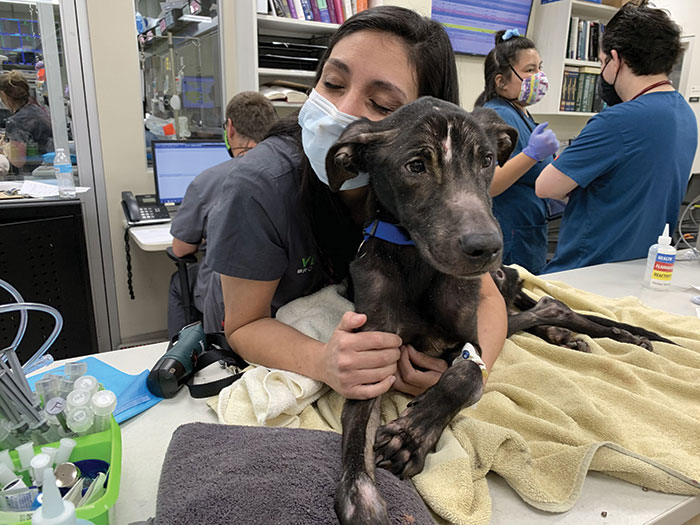Photo Courtesy of VERG
According to vets, “compassion fatigue” is leading to more resignations, with many staff members unable to bear the stress associated with helping those who are suffering, which can lead to isolation, depression and substance abuse.
By Forum Staff
While it’s commonplace for professionals in the veterinary industry to feel an inherent desire to help animals, many practices and hospitals across the nation are seeing an efflux of employees leaving the veterinary sector due to working long hours, lack of staff and chronic emotional stress, leaders of a specialty and emergency veterinary hospital group recently noted.
The veterinarians from Veterinary Emergency & Referral Group, based in Brooklyn, have indicated that they are looking to combat this trend by providing emotional and financial support for employees, as well as informing the public of what they can do to support local veterinary clinics in distress.
According to VERG, many of the issues plaguing veterinary clinics derive from the repercussions of the pandemic and the increase in pet adoptions that came with it. After COVID-19 swept New York, shorthanded veterinary hospitals like VERG were forced to adapt their operational procedures to include curbside treatment, increased cleaning of all surfaces between appointments, and accommodations for staff members who were exposed to COVID-19, including adhering to quarantine guidelines.
“We’ve been seeing so many more patients during a time when we have so little help,” said Dr. Brett Levitzke, chief medical officer of VERG. “On top of 14-hour workdays and more pets coming in, there is the fact that we’re not always able to save every animal, which is really hard and a whole mental-health issue within itself.”
According to veterinarians at VERG, “compassion fatigue” is leading to more resignations, with many staff members unable to bear the stress associated with helping those who are suffering, which can lead to isolation, depression and substance abuse.
After VERG lost six employees in one month, the hospital introduced a series of changes to help retain workers. These changes include offering a sign-on bonus of up to $2,000, increasing salaries and even making social workers available for staff looking to talk through their issues. VERG has also increased differential pay for weekend and overnight shifts with the goal of increasing availability and freeing up veterinarians for more patients.
In addition to employee turnover, COVID-19’s disruption has caused extended wait times and scarce appointment availability at veterinary clinics, with some practices even refusing new clients. As a result, worried pet owners are bringing their pets to emergency animal hospitals like VERG for basic care. According to the staff at VERG, the 90 percent increase in new patients combined with staff shortages has had long-reaching effects on the hospital’s staff and who they are able to treat.
To deter unnecessary patient visits, which will ultimately free up availability for veterinarians, VERG has detailed a list of pet crises that necessitate an emergency animal hospital visit:
- If your pet has a hard, swollen or bloated abdomen, which can be caused by many issues including heart failure, liver dysfunction, uterine infection or internal bleeding.
- If you own a dog and they have ingested dangerous toxins, including chocolate, avocados, grapes, over-the-counter medication, or the artificial sweetener Xylitol.
- Repeated bouts of vomiting or diarrhea can lead to rapid dehydration in animals, which can be symptoms of serious complications such as poisoning or gastrointestinal obstruction.
- If your pet is showing obvious signs of pain like vocalizing, panting, drooling, or severe limping.
- If your pet has not had food or water in 24-36 hours.

